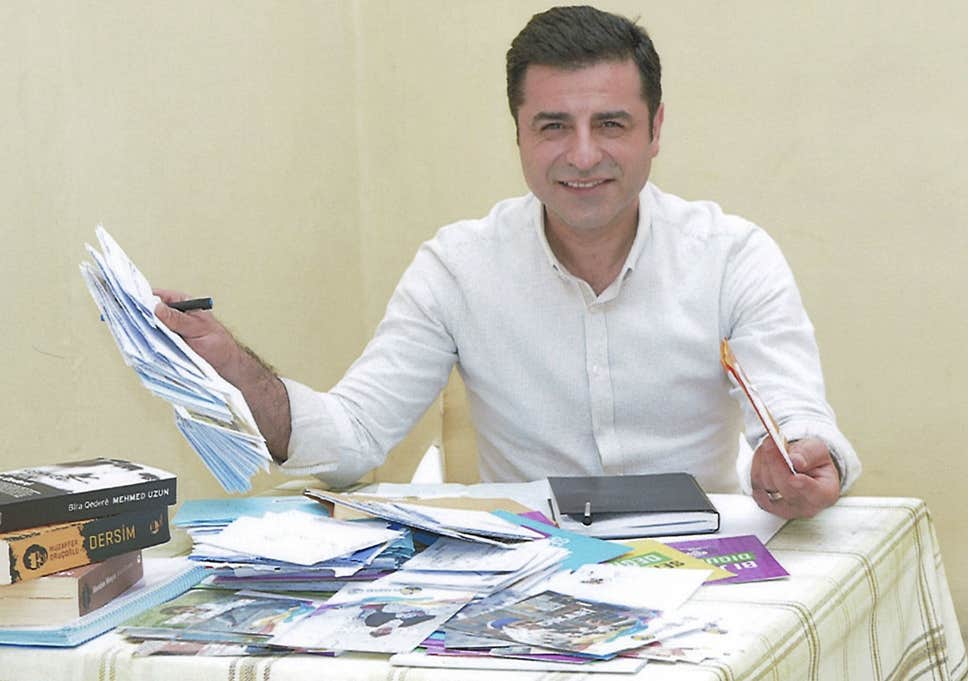Reviewing an application for the release of Selahattin Demirtaş, a court in Ankara has ruled for the continuation of his imprisonment, stating that there was “no change in the legal stipulation of the suspect.”
After the European Court of Human Rights (ECtHR) ruled on Tuesday (December 22) Demirtaş should be released immediately, his attorneys applied to the Ankara court, demanding the implementation of the judgment.
Demirtaş, a former co-chair of the Peoples’ Democratic Party (HDP), is currently in pre-trial detention as part of an investigation into the 2014 Kobanê protests, which claimed more than 50 lives in the Kurdish-majority eastern and southeastern provinces.
The Ankara 7th Penal Court of Peace said that Demirtaş shouldn’t be released because it didn’t obtain the Turkish translation of the European court ruling.
The Ankara Chief Public Prosecutor’s Office requested the translation of the ruling from the Ministry of Justice but has yet to receive a response while Demirtaş’s attorneys put the English version of the ruling in their petition, the penal court of peace noted.
“… because it could not be known which application the ECtHR ruling referred to, which offenses it concerns and the scope of the ruling, it has been understood that the ruling in question is not suitable for legal review,” the court concluded.
The European top court has ruled that Demirtaş’s imprisonment violated freedom of expression, the right to liberty and the right to be elected, which are protected by the European Convention on Human Rights.
Ramazan Demir, an attorney of Demirtaş, had told bianet that “Demirtaş must be released immediately according to this judgement; Turkey has no justification left to fall back on.”
| Trial of Selahattin DemirtaşSelahattin Demirtaş was detained on November 4, 2016. He was arrested and sent to Silivri Prison in İstanbul on the same day. He is still behind bars in Silivri.All his investigations, except for one, have been combined in a single file. The lawsuit filed at the Ankara 19th Heavy Penal Court has still not been concluded. As his request for release as part of this suit was rejected, his attorneys appealed to the Constitutional Court.In their application to the Constitutional Court on May 29, 2018, the attorneys requested that his application be reviewed with priority. However, the Court has not yet responded to the application. On June 26, 2018, his case was taken to the ECtHR.Shortly after this appeal to the ECtHR, the court announced its judgment in his second case. Tried in the case together with former HDP MP Sırrı Süreyya Önder, Selahattin Demirtaş has been sentenced to 4 years, 8 months in prison on the charge of “propagandizing for a terrorist organization” by the İstanbul 26th Heavy Penal Court.One month later, on October 25, 2018, his verdict of conviction reached the 2nd Penal Chamber of İstanbul Regional Court of Justice, the court of appeal.On November 17, 2018, the ECtHR announced that it would announce its judgment as to his application on November 20. The court of appeal swiftly reviewed the verdict of conviction of Demirtaş and started discussing it on November 19.On November 20, 2018, the ECtHR concluded that Demirtaş was “arrested with political motivations” and ruled for his release.The Ankara 19th Heavy Penal Court rejected his request for release on November 30, 2018, indicating that “his arrest was a moderate measure”.On December 4, 2018, the 2nd Penal Chamber of İstanbul Regional Court of Justice upheld his verdict of conviction. With this verdict, Demirtaş became an arrested convict.The attorneys of Demirtaş appealed again to the ECtHR on February 19, 2019, and requested that the issues not discussed, found inadmissible and not regarded as violation right be reviewed again.The government also appealed against the ECtHR verdict on Demirtaş. In its petition, the government also requested that the ECtHR review its ruling of right violation again. That being the case, the case of Demirtaş has been taken to the ECtHR Grand Chamber, which announced that it would discuss the application on September 18, 2019.In his hearing at the Ankara 19th Heavy Penal Court on September 2, the court board has ruled that Demirtaş shall be released.Demirtaş has not been released. |
| 2014 Kobani protestsBefore the protests held to support Kobani in northern Syria in 2014, those who were waiting in the district of Suruç, Urfa in southeastern Turkey and wanted to cross the border were intervened with pepper gas and rubber bullets. In the meantime, some pictures allegedly showing ISIS militia crossing the border of Turkey were published.President and ruling AKP Chair Recep Tayyip Erdoğan made statements indicating that they equated PKK with ISIS. While the wounded coming from Kobani were kept waiting on the border, the wounded from ISIS were treated at hospitals. Several news reports were reported in the press, saying “Kobani fell.” These news reports were denied every time. After the HDP made a call to take to the streets against a possible massacre in Kobani, thousands of people protested in Kurdish-majority provinces as well as Ankara and İstanbul. While left parties also supported these protests, deaths also occurred with the onset of police violence. Street conflicts ensued. 42 people lost their lives from October 6 to 12, 2014.According to a report by the Human Rights Association (İHD), 46 people died, 682 people were wounded and 323 people were arrested in the protests held between October 6 and 8, 2014. As reported by the AA, 31 people lost their lives, 221 citizens and 139 police officers were wounded.The Ankara Chief Public Prosecutor’s Office began investigating the incidents a year ago. First, the depositions of former jailed HDP Co-Chairs Figen Yüksekdağ and Selahattin Demirtaş were interrogated as part of this investigation. Released in the trial where he had been arrested pending trial, Demirtaş faced another ruling of arrest as part of this “Kobani investigation” on the same day. |
Source: Bianet



